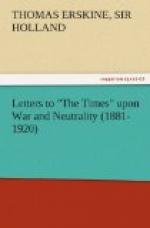The Pan-American exposition has done its work thoroughly, presenting in its exhibits evidences of the highest skill and illustrating the progress of the human family in the western hemisphere. This portion of the earth has no cause for humiliation for the part it has performed in the march of civilization. It has not accomplished everything from it. It has simply done its best, and without vanity or boastfulness, and recognizing the manifold achievements of others, it invites the friendly rivalry of all the powers in the peaceful pursuits of trade and commerce, and will co-operate with all in advancing the highest and best interests of humanity.
The wisdom and energy of all the nations are none too great for the world’s work. The success of art, science, industry and invention is an international asset and a common glory.
After all, how near one to the other is every part of the world. Modern inventions have brought into close relation widely separated peoples and made them better acquainted. Geographic and political divisions will continue to exist, but distances have been effaced. Swift ships and swift trains are becoming cosmopolitan. They invade fields which a few years ago were impenetrable. The world’s products are exchanged as never before, and with increasing transportation facilities come increasing knowledge and larger trade. Prices are fixed with mathematical precision by supply and demand. The world’s selling prices are regulated by market and crop reports.
We travel greater distances in a shorter space of time and with more ease than was ever dreamed of by the fathers. Isolation is no longer possible or desirable. The same important news is read, though in different languages, the same day in all Christendom. The telegraph keeps us advised of what is occurring everywhere, and the press foreshadows, with more or less accuracy, the plans and purposes of the nations.
Market prices of products and of securities are hourly known in every commercial mart, and the investments of the people extend beyond their own national boundaries into the remotest parts of the earth. Vast transactions are conducted and international exchanges are made by the tick of the cable. Every event of interest is immediately bulletined. The quick gathering and transmission of news, like rapid transit, are of recent origin and are only made possible by the genius of the inventor and the courage of the investor. It took a special messenger of the Government, with every facility known at the time for rapid travel, nineteen days to go from the city of Washington to New Orleans with a message to General Jackson that the war with England had ceased and a treaty of peace had been signed. How different now!




